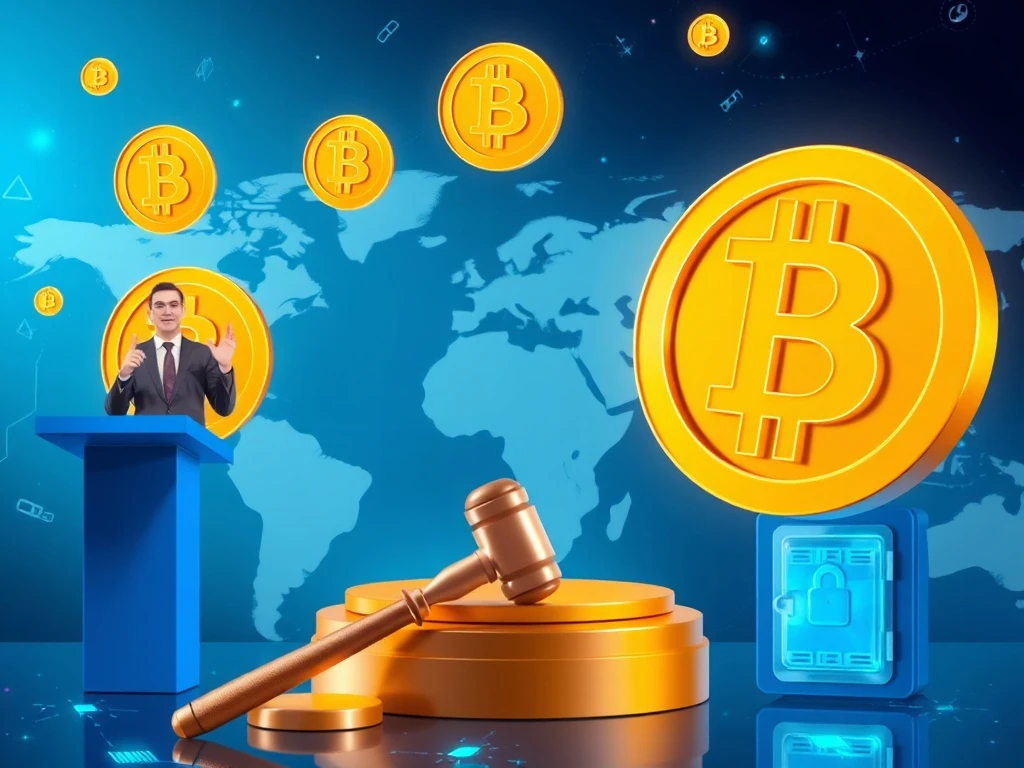Bitcoin Unveils Crucial Shifts: Price Predictions, Regulation, and Quantum Security

Today’s **crypto news** brings significant developments across the digital asset landscape. From bold **Bitcoin price** predictions to critical regulatory actions and innovative security measures, the crypto world is constantly evolving. Investors and enthusiasts alike closely watch these trends. Therefore, understanding these daily movements is essential for anyone involved in the space.
Bitcoin Price Predictions Fuel Optimism and Debate
The **Bitcoin price** continues to spark fervent debate among experts. Eric Trump, co-founder of American Bitcoin (ABTC), recently made a significant prediction. Speaking at the Bitcoin Asia 2025 conference in Hong Kong, Trump stated confidently that Bitcoin (BTC) will reach $1 million in the coming years. “There’s no question that Bitcoin hits $1 million,” Trump affirmed on Friday. This optimistic forecast reflects a growing sentiment among some industry leaders.
Furthermore, Trump highlighted the increasing institutional interest. He noted that savvy financial investors are actively acquiring BTC. This group includes institutions, sovereign funds, and wealthy families. “You’ve got nation states that are buying the hell out of Bitcoin,” he added. “You’ve got Fortune 500 companies that are buying the hell out of Bitcoin.” These entities recognize Bitcoin as a crucial digital store of value. Consequently, this broad **Bitcoin adoption** by major players fuels the bullish outlook.
Many analysts also foresee seven-digit BTC prices. They often cite ongoing global fiat currency inflation as a primary driver. Therefore, the discussion around Bitcoin’s future value remains a hot topic. This ongoing conversation underscores the asset’s evolving role in the global financial system.
Crypto Regulation Takes Center Stage in India
Meanwhile, **crypto regulation** has led to severe consequences in India. An Indian anti-corruption court delivered a landmark judgment on Friday. It sentenced 14 individuals to life imprisonment. This group included 11 police officials and a former Bharatiya Janata Party (BJP) Member of Legislative Assembly (MLA).
The case involved the kidnapping and extortion of crypto from a Surat-based businessman in 2018. Special Judge B.B. Jadav in Ahmedabad found the group guilty of several serious charges. These included criminal conspiracy, kidnapping for ransom, illegal detention, and assault. Former Amreli district superintendent of police Jagdish Patel and ex-MLA Nalin Kotadiya were among those convicted. All 11 police officers also faced charges under the Prevention of Corruption Act. This demonstrates a strict stance against misconduct by public servants.
The case centered on businessman Shailesh Bhatt. He had reportedly recovered a portion of his lost investment from BitConnect developer Dhaval Mavani. This recovery came in the form of **Bitcoin** after the $900 million company shut down. This high-profile case highlights the critical need for clear legal frameworks in the crypto space. It also shows the serious repercussions for those who exploit the nascent industry for criminal gain.
El Salvador Boosts Security Against Quantum Computing Threats
In a proactive move, El Salvador has addressed potential future threats. The nation redistributed its substantial **Bitcoin** reserve holdings. It moved them into 14 new wallet addresses. This action serves as a precaution against theoretical **quantum computing** threats.
El Salvador’s Bitcoin Office explained its strategy in an X post on Friday. “By splitting funds into smaller amounts, the impact of a potential quantum attack is minimized,” they stated. Each new Bitcoin address now holds a maximum of 500 BTC. This reduces the risk associated with any single wallet.
The office further elaborated on the vulnerability. Once funds are spent from a Bitcoin address, its public keys become revealed. This makes them a potential target for quantum computers to crack. This could become a significant threat in the future. Experts estimate that over 6 million Bitcoin, valued at around $650 billion, could be at risk. This scenario assumes quantum computers become powerful enough to crack elliptic curve cryptography (ECC) keys.
However, current assessments indicate that quantum computing is still far from capable of hacking Bitcoin. Quantum research company Project Eleven noted this in April. A Bitcoin private key contains 256-bits. Yet, no quantum computer running Shor’s algorithm has managed to crack even a 3-bit key. Therefore, El Salvador’s move is a forward-thinking measure. It safeguards against a distant, albeit potential, technological advancement.
The Expanding Landscape of Bitcoin Adoption and Security
These events collectively paint a picture of an expanding and maturing crypto ecosystem. The optimistic **Bitcoin price** predictions, driven by increasing **Bitcoin adoption** from institutions and nations, signal a robust future. Furthermore, the firm hand of **crypto regulation** in cases like India underscores the need for legal clarity and consumer protection. Meanwhile, nations like El Salvador are taking innovative steps. They are bolstering security against advanced technological threats like **quantum computing**. These daily developments demonstrate the dynamic nature of the cryptocurrency world. They highlight both its immense potential and the ongoing challenges it faces.








